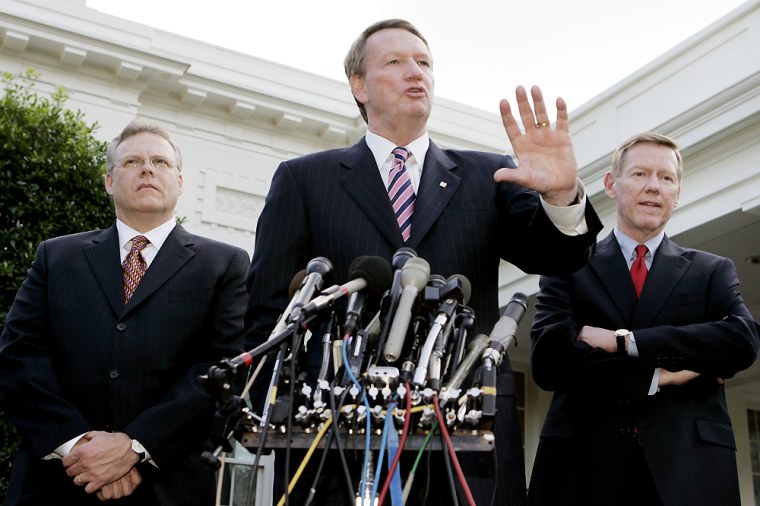The leaders of America’s Big Three domestic automakers finally got their audience with President Bush at the White House Tuesday, describing their meeting “candid and productive.” But analysts say the meeting is unlikely to change the outlook much for Detroit’s big automakers.
GM Chairman and Chief Executive Rick Wagoner, Ford Chief Executive Alan Mulally and Tom LaSorda, president and chief executive officer of Chrysler Group visited Washington as their companies are making massive job cuts and closing plants in an effort to stay competitive with their overseas rivals.
Their hour-long meeting with Bush and Vice President Dick Cheney, delayed for six months because of scheduling conflicts, was designed to raise the Bush administration’s awareness of some of the obstacles facing the companies, including the rising cost of health care, pensions, energy and commodities, like steel.
The auto executives also raised trade issues, such as the big advantage an artificially weak yen is giving Detroit’s Japanese rivals. GM’s Wagoner, speaking to reporters on the White House driveway after the meeting, said Japan “systematically” undervalues its yen currency, and that the three executives raised the issue directly with President Bush.
Wagoner said the automakers share a “strong conviction that the Japanese yen is systematically undervalued, which helps them to maintain significant trade balance surpluses in our industry,” adding: “I can’t honestly say that it appeared the president 100 percent saw it that way.”
Mitch Stapley, an analyst at Fifth Third Asset Management, said he was concerned the Big Three executives had spent too much time discussing currency manipulation with President Bush. U.S. automakers complain the Japanese government artificially suppresses the yen, making imported goods from Japan cheaper, including cars.
“If you have Honda making 80 percent of the vehicles it sells in the U.S. inside the U.S. and Toyota making 70 percent, you’re wasting your time,” he told CNBC. “You need to focus on pension and health care costs — that’s what will turn these companies around.”
Stapley said he is more concerned about what the big U.S. companies will need to get back to profitability.
“Ford just told us they won’t get back to profitability until 2009,” he said, adding that the major U.S. automakers still need to deal with a labor agreement that expires in September 2007. Health care and pension issues are also facing the Big Three, he said. If union negotiations lead to a strike, “then the financial cards are in the air for these guys,” he said.
Alan Tonelson, a research fellow at the U.S. Business and Industry Council, a Washington-based research organization, said he doesn’t think the Big Three have their act together in terms of asking for presidential assistance.
“Here they are talking about a trade imbalance because of a weaker yen, and while that issue is not really in doubt, I think it’s always a mistake to focus on a single foreign trade practice,” he said. “Foreign governments have a lot of latitude to change trade policy tactics, so if Japan did revalue their currency they could still easily increase other trade barriers and produce the same effect.”
When it comes to purely domestic issues, such as the rising cost of health care, Detroit is unlikely to see much near-term relief Tonelson added.
High health costs for employees and retirees, which adds some $1,000 to the cost of every car they make, is one of the biggest problems the Big Three face. GM, the nation’s largest private provider of health care, spent $5.3 billion on health care last year for 1.1 million employees, retirees and their dependents. Automakers argue that they have already negotiated significant benefit reductions with their labor unions and say now it’s up to Washington to fix the broader national problem.
“There is really very little that Bush is going to be able to do in the next two years to apply a major fix to the U.S. health care system,” Tonelson said. “As we found out in the 1990s, health care is a highly contentious issue, and there is very little agreement between Democrats and Republicans, or even within the two political parties, on what to do. So I don’t think the automakers have time to wait for the U.S. healthcare system to be fixed.”
The U.S. auto industry is in need of a shot in the arm. The Big Three U.S. automakers have seen their U.S. market share eroded over the last six years, falling from 69 percent of the North American market to 57 percent, according to auto forecasting company CSM. Over the same period Japanese auto giants Honda, Nissan and Toyota have seen their market share rise from 20 percent to 31 percent.
Politically, the wind may be blowing in Detroit’s favor. The political landscape has changed radically since last spring, when the automakers originally were supposed to meet with Bush, although it is not clear how or whether the industry will benefit from last week’s midterm elections, which swept Democrats into power in the House and Senate.
One promising sign for the Big Three is the ascendance of Rep. John Dingell, D-Mich., a longtime friend of the industry who is in line to lead the House Energy and Commerce Committee.
“Dingell is a glimmer of hope,” said Tonelson. “He understands the trade policy challenges that these companies face; in fact, he probably understands the problems better than the Big Three themselves.”
For their part, the auto executives said Tuesday’s meeting with Bush was worthwhile. They said they pressed their concerns about health care and trade issues while making clear the troubled industry does not want a federal bailout.
“The president clearly understands the importance of the business to the United States and the global economy,” Ford’s Mulally told reporters. “I was very impressed with the president’s knowledge of the situation and his commitment to partner with us on these issues going forward.”
